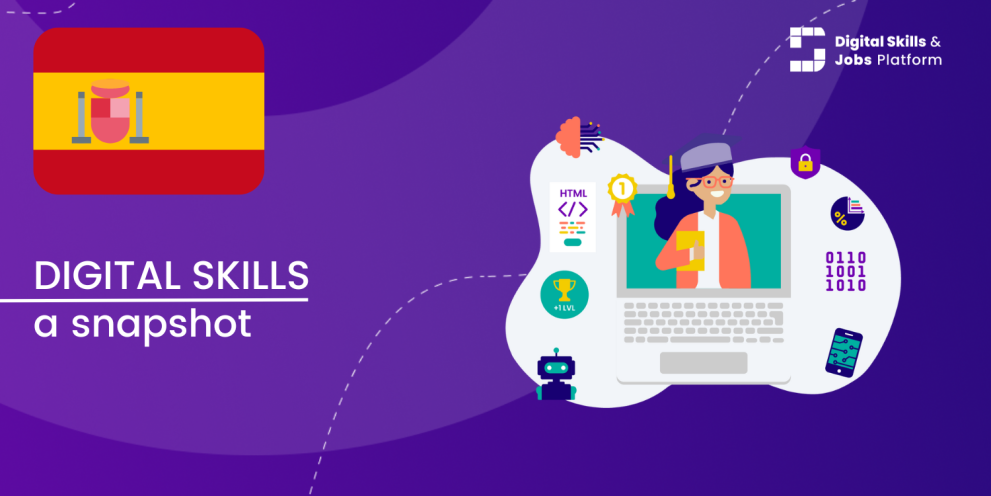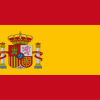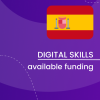Spain: a snapshot of digital skills

Introduction
In the 2024 edition of the Digital Decade report, Spain has achieved 66,2% basic digital skills coverage, growth comparing to 64,2% in 2023 and now surpassing the EU average of 55.6%.
According to the Digital Decade report 2024, Spain performs slightly below the EU average in the indicator - the percentage of ICT specialists in employment. With a growth from 4,3% in 2023 to 4,4% in 2024 Spain is performing below the EU average of 4.8%.
The report Unlocking Spain’s Digital Potential by PublicFirst looks at the progress till 2021 that Spain has made in pursuit of Digital Decade EU targets, and how further acceleration can be achieved through partnership between governments, businesses, and citizens. A shortage of digital skills is impeding growth for the most digitally advanced companies. 81% of businesses view digital skills as important or essential - rising to 95% for digitally intensive businesses. 38% of digitally intense businesses said that the shortage of digital skills has slowed their growth, 27% that it has increased costs, and 29% that it has slowed the development of new technology. The report states that it will be hard to meet the EU’s target of 20 million ICT specialists by 2030 without improving inclusion, as, based on current trends less than 23% of ICT specialists in 2030 will be female, rising from 19% in 2022.
The Spanish Coalition of Digital Skills and Jobs is coordinated by AMETIC, the business association of the digital industry, since 2017. The coalition gathers 200 stakeholders (companies, public administrations, training centres and universities) actively involved in promoting digital skills and closing the gap between the supply and demand side of ICT specialists in Spain. Many stakeholders are also members of the Digital Skills Hub, recently created under the National Digital Competences Plan to support the government in designing and monitoring digital skills policies.
Overview of state strategies and national initiatives
State strategies
In July 2020 the Spanish Government launched the Digital Spain 2025 agenda, which was later updated to Digital Spain 2026 roadmap for the country's digitalization process. This agenda was conceived as one of the pillars of Spain's Recovery, Transformation and Resilience Plan, after the pandemic crisis, as well as a vector of modernisation and prosperity in the medium term, acting on the triple dimension of: (i) infrastructure and technology, (ii) economy, and (iii) people. In order to channel the digitalization process, eight specific digital plans have been adopted: (i) The Digital Infrastructures and Connectivity Plan for society, economy and territories, (ii) Strategy for the promotion of 5G Technology, (iii) ENIA, National Artificial Intelligence Strategy, (iv) National Plan for Digital Skills, (v) SME Digitalization Plan, (vi) Public Administration Digitalization Plan, (vii) Spain Audiovisual Hub of Europe, (viii) National Cybersecurity Plan.
Spain adopted the National Digital Competences Plan in January 2021 to promote digital skills development of people in Spain, but particularly for workers and ICT specialists. The National Digital Competences Plan sets out several measures under seven action lines: 1) digital skills training, with special emphasis on population groups at risk of digital exclusion; 2) bridging the digital gender divide; 3) digitalising the education system and developing digital skills for learning; 4) digital skills training throughout working life 5) digital skills training for public sector workers; 6) digital skills training for SMEs; and 7) increasing the supply of ICT specialists (via vocational training and university education).
National initiatives
Several measures outlined in Spain’s Recovery and Resilience Plan support the acquisition of digital skills, especially for employees of SMEs. Those measures, together with other technology-specific initiatives such as cybersecurity or artificial intelligence (AI), are expected to reduce the labour market gap for ICT specialists as well as the ICT gender gap. Spain’s recovery and resilience plan supports the digital transition with investments in the digitalisation of the public administration, in digital skills and digital inclusion, in cyber security and in connectivity. The plan includes significant reforms in this area, including the Digital Spain Agenda 2026, Digital connectivity, promotion of cybersecurity and deployment of 5G, the Artificial Intelligence strategy, the National Digital Skills Plan and a law on telecommunications to upgrade the regulatory framework with the development of new regulatory and enforcement instruments.
To ensure equal access to digital opportunities the Plan de Digitalización y Competencias Digitales del Sistema Educativo (Plan for Digitalisation in education) will enhance access to digital learning through the provision of portable devices to at least 300,000 students from vulnerable groups in public or publicly subsidised schools. It will also install, update and maintain interactive digital systems in public and publicly subsidised schools to enable distance and blended learning. The measure will also support the preparation or revision of a digital strategy in school centres and includes the digital training of teachers. Vocational Education and Training will also be supported through a digital accreditation tool for professional skills acquired through work experience.
Educa en Digital initiative is part of Digital Spain 2026 agenda. It started in the 2020/2021 academic year aiming at closing the existing gaps in schools on access to technologies by increasing the quality of digital tools and providing teachers with training on digital. The Educa en Digital initiative consists of a set of actions to support the digital transformation of the education system by providing devices, digital educational resources, the adaptation of teachers' digital skills and actions that involve the application of artificial intelligence and personalisation in education
Barcelona Digital Talent offers a range of free services to raise awareness, guide, train and connect emerging digital talents with businesses, promotes ecosystem activities between businesses, training centres and institutions to generate debate and knowledge about the digital skills gap by organising community events, publishing reports on digital skills in different areas and organizing masterclasses for companies in different areas of common interest.
The IT Academy, aims to foster digital talent among citizens in order to ensure digital growth and business competitiveness. It is organized as a campus for junior web programmers that promotes reskilling towards the digital sector of those professional profiles that come from economic sectors, providing high value to the IT industry that requires digital talent to grow and improve its competitiveness. IT Academy training is free and inclusive.
National Institute of Cybersecurity (INCIBE) is organising the La Academia Hacker to promote learning and technical skills in cybersecurity. They organize different trainings and competitions about cyber surveillance, forensic, malware analysis, network security, etc. In March 2022, INCIBE presented the Análisis y Diagnóstico del Talento en Ciberseguridad en España (Cybersecurity Talent Diagnostic) to align actions with market demands on ICT specialists.
Funding opportunities
Funding opportunities for upskilling and reskilling to support the digital competences of individuals and organizations are available in form of loans, grants and financial instruments. For the period 2021 – 2026 most of the activities in digital transformation are financed through Recovery and Resilience facility but also as activities in Horizon, Erasmus+, ESIF and EEA grant schemes. You may find more on the page of Spanish National Digital Skills and Jobs Coalition and in the article on the Digital Skills and Jobs Platform.





